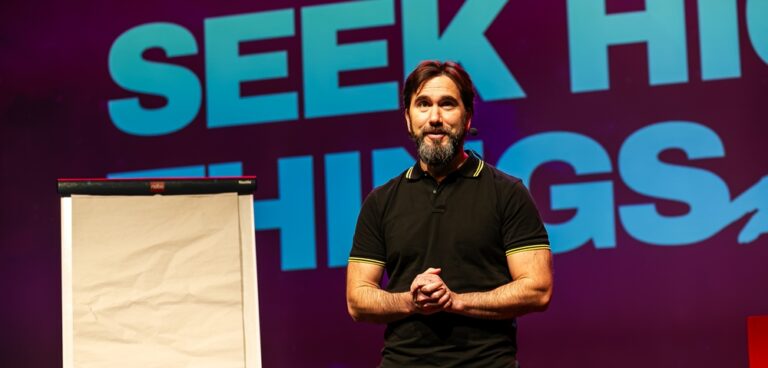International communication and influence expert, Jose Ucar, looks at the importance of developing strong communication and speaking skills in a world where AI and technology are rapidly evolving. Jose discusses why these human skills remain essential for leaders and professionals who want to connect, influence, and make a meaningful impact.
Artificial Intelligence has done something incredible: it has given us access to more knowledge, more quickly, than at any point in human history. With a few clicks, we can learn just about anything. But knowing more doesn’t necessarily mean we connect more. And it certainly doesn’t mean we influence, inspire or lead better.
That’s where the power of public speaking and presentation skills comes in.
AI might bring you the facts, but it won’t bring your presence. It can’t replace your character, your confidence, your attitude, your resilience, or your ability to self-reflect. These qualities, so essential to human connection, are at the heart of powerful communication, and they’re more vital now than ever before.
The Ancient Art We Still Need Today
Public speaking isn’t new. The ancient Greeks were masters of it. In fact, around the 5th century BC, speaking well in public wasn’t just admired, it was a civic duty. Figures like Pericles used speeches to shape Athens’ democracy. The Stoic philosopher Epictetus, whose teachings still resonate today, often addressed audiences on topics like self-mastery, responsibility, and the power of our internal dialogue. And Aristotle, in his seminal work Rhetoric, laid out the foundations of persuasive communication, introducing concepts like ethos (credibility), pathos (emotion), and logos (logic), which are still taught in public speaking courses today.
They knew then what still holds true now: ideas don’t change the world unless they’re effectively communicated.
Speaking Skills Are Life Skills
Presentation skills today go far beyond stages and microphones. They’re for the boardroom. For coaching your team. For navigating tough conversations. For pitching new ideas, influencing stakeholders, running meetings, and sometimes even talking to your teenager with grace under pressure.
When you can stand up and speak clearly, with intention and confidence while connecting with the people in front of you, it’s not just a communication skill. It’s a leadership skill. It’s a life skill.
It’s Not Just Training, It’s Transformation
People often leave my sessions inspired and excited… and completely drained. Why? Because we do the real work. We don’t just talk about communication, we practice it, we stretch, we grow, we stumble and recover. Some tell me it feels like therapy. That’s not an accident. It’s because when we speak in public, our whole self shows up.
The fight-or-flight response kicks in. Our beliefs, values, past experiences, and internal dialogues collide. I call this “the mushy brain” – a kind of mental fog where everything mixes together and nothing comes out quite right.
And that’s exactly where the magic happens.
We work to unmush the brain. To break through the noise. To let your authentic self, the real you, shine. That’s not something an AI can coach you through. That takes presence, practice, and courage.
The Future Belongs to Human Communicators
In a world of algorithms and automation, the most human skills are becoming the most valuable. Empathy. Storytelling. Listening. Influence. Presence.
No matter how advanced technology becomes, the need to communicate powerfully, connect meaningfully, and lead confidently will never go out of style.
So yes, embrace AI. Use it. Leverage it.
But don’t forget to develop you – your voice, your confidence, your ability to move a room and make an impact.
Because knowledge alone won’t cut it.
But knowledge, paired with powerful communication?
That’s what changes the game.

